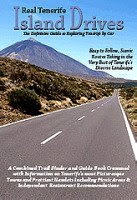There’s a rule when it comes to recommending restaurants that is applied in nearly every travel guide book and also in countless travel articles.
It’s this: A restaurant where the locals eat must be the place to eat. As rules go, it’s not a bad one. We’ve applied it everywhere we’ve visited and usually ended up enjoying a good meal.
However, living in Tenerife and getting to know the local culture and quirks has made me view this rule slightly differently and with slightly more caution.
Firstly, as we talk about in 'Going Native in Tenerife' in more detail, Canarios generally have a conservative nature when it comes to dining. They like Canarian food which tends to be simple dishes of grilled meat and fish with papas arrugadas (literally wrinkled potatoes). Any vegetable or salad accompaniment isn’t usually the most imaginative in the world.
The mainland Spanish don’t always hold Canarian cooking in high esteem and I’ve had restaurant owners go out of their way to make it clear that their restaurant serves Basque, or Galician dishes rather than Canarian.
Canarios aren’t the best at experimenting with food from other countries apart from maybe Italian. So what that means is that when you see a restaurant filled with Canarios, you can bet your house on the fact that the menu will be traditional Canarian cooking and almost exactly the same as every other Canarian restaurant on the island. However, lots of local clients usually means that the food served will be a notch above other restaurants dishing up the same fare. La Tasquita de Min beside Puerto’s harbour is a prime example of this. Their fish is simply prepared and divine tasting (the parrot fish, vieja, is particularly good) and on Sundays it’s almost impossible to get a table as they are filled with well to do Canarios.
But whilst full tables may be a sign of the best Canarian restaurants, it doesn’t necessarily mean that they're the best restaurants full stop. In areas which are popular with a mix of nationalities, there’s a choice of dining from all over the world, but they might not be frequented by ‘locals’, or Canarian locals anyway.
And this raises another factor which applies to places where there is a high ex-pat population. And that is what people mean when they use the term ‘local’.
In an article we wrote about restaurants in Valle Gran Rey on La Gomera, we include a cheap and cheerful joint which served up everything from Canarian cooking to pizzas. When we told our friend who lives on La Gomera that we were including this restaurant she announced:
“But no locals ever eat there.”
Her statement surprised us because when we’d eaten there the other diners included a large group of workmen and some young couples – all Canarios.
It turned out that the locals she was referring to were the resort’s large, German ex-pat population.
Similarly on websites like Tenerife Forum, the majority of whose members mainly live or holiday in the south of Tenerife (where most of the British ex-pat population reside) when people talk about places the locals eat, they might be referring to ex-pat locals rather than ‘Canario’ locals.
Clearly it’s legitimate to use the term local for someone who lives here irrespective of where they originated. But if you’re planning a holiday, or even looking for a place to live for a while, it’s a distinction that you need to be aware of the next time someone recommends somewhere because it’s ‘where the locals eat’.
Say Halo Halo Halo For Saintly Memories
8 months ago






No comments:
Post a Comment